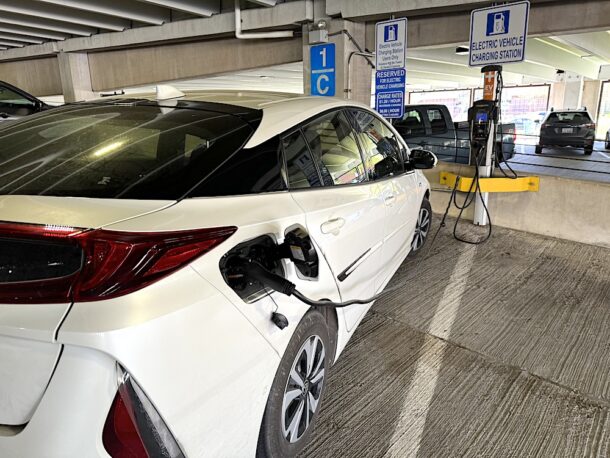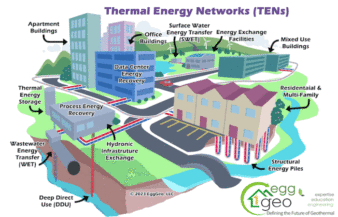The auto tides have definitely begun changing in recent years, and one message that we hear time and again is this – EVs offer an invaluable way for all of us to reduce our carbon footprints.
This is an undeniable fact, with EVs emitting around a quarter of the carbon dioxide of their gas-powered counterparts. In other words, a single EV can save about as much carbon as would be required to fly from JFK to Kansas City four times!
That’s a pretty impressive reduction, and in an age of climate crisis, it’s a benefit that none of us are in a position to overlook. As with anything climate-based, however, there is another side to the story.
Much like how it’s not particularly ‘good’ eco practice to ditch your existing plastic tubs for glass ones, many vehicle owners are conflicted about whether scrapping their old vehicles for shiny new EVs is actually in-line with their values.
Unfortunately, there’s no easy answer to that question but, in some cases, upgrading the car you’ve got with the environment in mind could be a better option. We consider why in this article.

Breaking Down the Undeniable Benefits of EVs
A disclaimer – none of this is to say that EVs don’t remain one of the most effective ways to reduce our high emissions on the roads. If you’re genuinely looking for a new vehicle, there are undeniable benefits to delving into your EV options, and not just because the US has made a vow to use solely zero-emissions transportation by 2050.
In reality, EVs offer countless benefits on both the ownership and eco front, including –
- A holistically sound eco choice: Despite valid concerns about the climate cost of EV battery production, EVs remain a sound eco choice when considered holistically. Benefits including zero tailpipe emissions and reduced fossil fuel dependency are just the tip of the iceberg for vehicles that stand to significantly reduce carbon footprints across their lifespans.
- Reduced running costs: On average, EVs cost as much as half to run per mile than petrol and diesel cars. Admittedly, upfront costs on the majority of EVs do remain higher, but this is easily offset by the fact that EV ownership could save between $6,000-$12,000 over that vehicle’s lifetime.
- Improved performance: As more manufacturers turn their attention to electric production, EVs are quickly outstripping petrol cars in the performance stakes. For one thing, they’re significantly quieter to drive, making a more enjoyable experience. Most modern EVs are also now superior in terms of performance markers like torque and acceleration.
But, What About The Climate Cost of Used Cars?
So far so good, but if you already have a car, you probably can’t just double it up with an EV right away. You need to work out what to do with your old vehicle, and that’s sort of where the problem lies. After all, even if you sell that old car, someone will still have it on the road. Plus you’ll be adding your EV to the mix.
So, why not get rid of that old vehicle so no one can have it? That may not be a great eco alternative, either. Luckily, most scrap yards do now operate recycling schemes that’ll see them reusing many of an old car’s raw components, but the process is by no means fool-proof.
After all, there’s simply no telling which scrapped parts will ultimately end up in landfill. The chances are that at least a few materials like metal, plastic, and rubber, will make their way to landfill eventually, where they’ll take years to decompose.
Even if some parts are recyclable, intensive extraction processes can release carbon emissions of their own. All of which are a direct result of your EV replacement. Add that to the estimated 10 tons of greenhouse gases required for EV production, and you’re looking down the barrel of yet another environmentally costly choice.
Fear Not, There Are Factors To Consider
So far so worrying, but we have some good news – there are plenty of factors to consider when thinking about whether or not switching to an EV will ultimately be an eco-friendly choice. Because, as you can probably tell, this is no cut-dry issue! There are certainly no simple comparisons to be made because, in reality, every switch will throw up different realities.
It’s particularly worth considering the environmental impact of your current vehicle, which will have a major sway over how much an EV would reduce your emissions. Particular areas of focus should include –
- The carbon emissions of your current vehicle
- The car’s age and mileage
- Your particular preferences
Carbon emissions are a particularly important consideration, as some petrol models are inevitably better than others. You may find, then, that it makes less sense to keep a high-emissions model like the Mercedes-Benz G-Class G 63 AMG than it does to stick with a lower-emission option like the BMW 1 Series.
With some concerns expressed about potential EV longevity issues, keeping and upgrading a newer car with low emissions will typically be a more climate-conscious option than replacing that car with an EV because it seems like the best option.
Is It Really As Simple As That?: The Potential of Eco-Upgrades
Of course, even if you’re choosing to stick with your vehicle through thick and thin, making this the best environmental choice still requires you to consider upgrades with the environment in mind. Luckily, there are plenty of things you can do to make even petrol or diesel cars more environmentally friendly, such as –
# 1 – Eco Parts Upgrades
Your vehicle will inevitably need new parts at some stage, and choosing eco alternatives at this time can make a huge difference to that vehicle’s carbon footprint overall. Luckily, there are plenty of viable options to choose from when the time comes.
The most obvious choices here include options like low-rolling resistance tires and aerodynamic enhancements such as carefully selected spoilers. A cat back exhaust could be another great option, as it reduces your vehicle’s weight and can also help to increase fuel efficiency and filter out harmful byproducts. In each instance, simply check the specs of any replacement, and choose the ones that look the most beneficial.
# 2 – Regular Maintenance
The better maintained your car, the more efficiently it’ll run. That’s a fact, and it highlights the importance of annual services, which will typically consider priorities like fuel changes and crucial engine checks to keep things ticking over.
Thorough checks of vehicle functionality will also help to significantly enhance benefits like fuel efficiency, by ensuring your engine is up to speed and equipped to perform seamlessly.
# 3 – Eco-Friendly Fluids
Many fluids in your vehicle will contain toxic elements that can contaminate water sources and generally do a fair amount of damage. Switching fluids in your vehicle for eco-friendly alternatives can make a huge environmental difference by reducing your output of harmful chemicals.
Top switches to consider include –
- Synthetic oil: Synthetic oil is generally better for your vehicle and offers benefits like reduced engine friction for a longer life. It also breaks down more slowly to ensure less waste over time.
- Coolants/windscreen wash: Always choose non-toxic, biodegradable coolants/windscreen wash.
- Brake fluid: High-quality brake fluid that meets safety standards can significantly reduce environmental impact overall.
# 4 – Switch to Battery
If you’re willing to go big with vehicle upgrades, then switching to a battery-powered engine could be a great option. This will make your engine even more eco-friendly than a hybrid, which will still rely on some degree of fossil fuels. By comparison, a battery-powered engine relies on lithium-ion power cells, which are both lightweight and easily recyclable.
# 5 – Make Small Positive Changes
It’s easy to focus on the ‘big’ stuff when it comes to reducing your vehicle’s environmental impact, but small-scale changes can be just as impactful, and they’re easy for everyone to implement.
The top small changes to make include –
- Avoid filling your engine to the top, as this can result in harmful vapors and fuel seepage.
- Avoid unnecessary idling by switching off the engine if you’re stationary for extended periods.
- Reduce your A/C usage in place of opening the window where possible, particularly on short journeys.
In Conclusion: The Choice is Down to You
Ultimately, there is no right or wrong answer as to whether it would be more sustainable to upgrade rather than replace your old vehicle. The choice is fundamentally dependent on the car model you’ve got and the amount of work you’re willing to put in to reduce its emissions.
However, if you do feel like loyalty is the most eco-conscious choice for you, then these tips for eco upgrades are guaranteed to make a difference to your vehicle’s harmful outputs. What’s more, these should become ongoing efforts that you keep on top with steps like regular maintenance to make sure you can stand by your decision for many years to come!




Join the conversation: